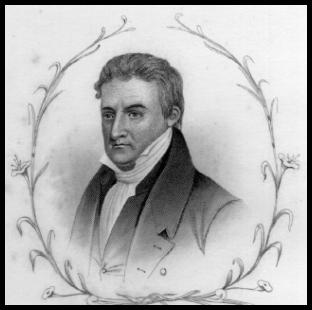Sources
- History of the Cumberland Presbyterian Church in Kentucky to 1988, by Matthew H. Gore, Joint Heritage Committee of Covenant and Cumberland Presbyteries. Memphis, Tennessee, 2000.
West Lexington Presbytery of the Presbyterian Church (USA) was formed from Transylvania Presbytery in 1799. It covered the area of Kentucky between the Kentucky River and the Licking River. In 1802, the West Lexington, Transylvania, and Washington Presbyteries were formed into Kentucky Synod, separate from the Synod of Virginia.

The Presbyterian Church (USA), abbreviated PCUSA, is a mainline Protestant denomination in the United States. It is the largest Presbyterian denomination in the country, known for its liberal stance on doctrine and its ordaining of women and members of the LGBT community as elders and ministers. The Presbyterian Church (USA) was established with the 1983 merger of the Presbyterian Church in the United States, whose churches were located in the Southern and border states, with the United Presbyterian Church in the United States of America, whose congregations could be found in every state.

The Cumberland Presbyterian Church is a Presbyterian denomination spawned by the Second Great Awakening. In 2019, it had 65,087 members and 673 congregations, of which 51 were located outside of the United States. The word Cumberland comes from the Cumberland River valley where the church was founded.

The Presbyterian Church in the United States was a Protestant denomination in the Southern and border states of the United States that existed from 1861 to 1983. That year, it merged with the United Presbyterian Church in the United States of America (UPCUSA) to form the Presbyterian Church (USA).

The Presbyterian Church in the United States of America (PCUSA) was a Presbyterian denomination existing from 1789 to 1958. In that year, the PCUSA merged with the United Presbyterian Church of North America. The new church was named the United Presbyterian Church in the United States of America. It was a predecessor to the contemporary Presbyterian Church (USA).
The Springfield Presbytery was an independent presbytery that became one of the earliest expressions of the Stone-Campbell Movement. It was composed of Presbyterian ministers who withdrew from the jurisdiction of the Kentucky Synod of the Presbyterian Church in the United States of America on September 10, 1803. It dissolved itself on June 28, 1804, with the publication of a document titled the Last Will and Testament of The Springfield Presbytery, marking the birth of the Christian Church of the West.

Louisa Mariah Layman Woosley was the first woman ordained as a minister in any Presbyterian denomination. She was ordained by the Cumberland Presbyterian Church on November 5, 1889.

Finis Ewing was the primary founder of the Cumberland Presbyterian Denomination on February 4, 1810.
James Wade Knight was a Cumberland Presbyterian minister. He served as that denomination's first Director of Ministry and was the Executive of Kentucky Synod.
Kentucky Synod was a synod of the Presbyterian Church in the United States of America established in the late 18th century.
The Cumberland Presbyterian Church in America is a historically African-American denomination which developed from the Cumberland Presbyterian Church in 1874.
Cumberland College in Princeton, Kentucky, was founded in 1826 and operated until 1861. It was the first college affiliated with the Cumberland Presbyterian Church. In 1842, the Cumberland Presbyterian denomination withdrew its support from Cumberland College in favor of Cumberland University in Lebanon, Tennessee. In doing so, the denomination intended to simply relocate the school from Princeton to Lebanon, but Cumberland College remained open without denominational support until the Civil War.
The Cumberland Presbytery existed from 1802 to 1806 as a presbytery of the Presbyterian Church in the United States of America, a predecessor to the Presbyterian Church (U.S.A.). The presbytery was strongly influenced by the Second Great Awakening and has an important place within the history of the Cumberland Presbyterian Church.
Transylvania Presbytery is a member of the Presbyterian Church (U.S.A.), within the Synod of Living Waters. It oversees 67 churches (2022).

Robert Hamilton Bishop was a Scottish-American educator and Presbyterian minister who became the first president of Miami University in Oxford, Ohio. A professor of history and political science, he wrote about the history of the early churches in the United States, as well as theology.
Rev. James McGready (1763–1817) was a Presbyterian minister and a revivalist during the Second Great Awakening in the United States of America. He was one of the most important figures of the Second Great Awakening in the American frontier.
Joseph James Bullock was a Presbyterian clergyman who served as the first Kentucky Superintendent of Public Instruction from 1838 until 1839, and as Chaplain of the United States Senate from 1879 until 1883.
The Presbyterian Church of Nigeria is a church in Nigeria and subscribes to the Westminster Confession of Faith.

Presbyterianism has had a presence in the United States since colonial times and has exerted an important influence over broader American religion and culture.

James McChord or M'Chord was an American Presbyterian minister and educator. He was educated at Transylvania University and the Associate Reformed Theological Seminary and began his ministry in Lexington, Kentucky, in 1813. Two years later, he founded what would later become Lexington's Second Presbyterian Church and served as its pastor until 1819. He taught and was a member of the Board of Trustees at Transylvania from 1813 to 1819, and he was elected to serve as the first president of Centre College in Danville, Kentucky, in March 1820 but died nearly three months later before officially assuming the position.